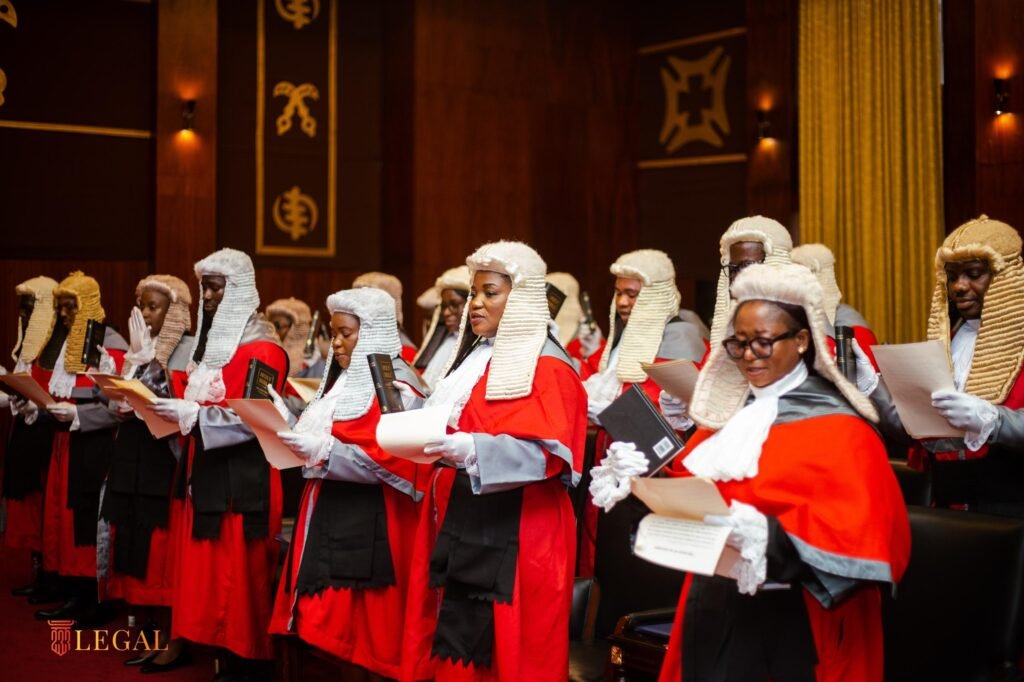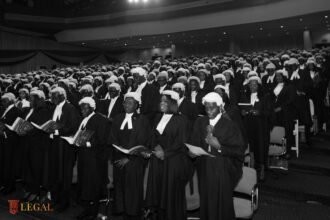

Introduction
A law clerk [or judicial assistant] is probably the one participant in the judicial process whose duties and responsibilities are most intimately connected with the judge’s own exercise of the judicial function.
Undoubtedly, the legal system in Ghana continues to evolve with an ever-increasing desire by many to play a role in the sector, howbeit, as lawyers, judges and the like. Even more so is the fact that not all legal enthusiasts are interested in simply becoming or staying as lawyers or judges. There are many brilliant individuals who desire to play the critical role of aiding the hands of justice – as full-time professional career judicial assistants or professional law clerks or judicial secretaries, however they may be called. It must be admitted that recently and as is the case currently, young and brilliant individuals serve as clerks or interns in the judiciary albeit in a fixed term nature usually lasting some few months or probably a year or two. This essay explores a long term well-cut out career path for persons who, by natural design, are born to help the hands of justice as a career until retirement or possibly with future plans to transition directly into the judiciary. There is the need to meet the changing needs of society and by so doing to be proactive in causing the change. It is submitted in this essay that one potential reform that could enhance the efficiency and effectiveness of the judiciary is the introduction of career judicial assistants or law clerks. These persons would provide full-time support to judges, assisting them with research, case management and other judicial tasks of relevance. This essay argues that Ghana should modernize its legal system by introducing these individuals to improve the functioning of the judiciary as well as provide a career path for aspiring judges all in a bid to strengthen judicial independence.
Judicial Assistants or Law Clerks in perspective
Courts, especially those in Ghana, operate under the pressure of a busy and varied docket. In fact, it is arguably said that many judges are running several mini law chambers altogether in the course of their judicial function. Judicial clerkship or assistantship, a phenomenon that first started in Massachusetts, USA in 1875 was carefully introduced due to the increasingly heavy workload of the then Chief Justice of the Massachusetts Supreme Judicial Court, Justice Horace Gray. The practice involved hiring a high-ranking recent law graduate as a legal secretary. In fact, when Justice Gray was appointed to the US Supreme Court in 1882, he brought this practice with him and soon thereafter the practice spread. It serves as the best practical educational experience in a lawyer’s life since these individuals get the unique opportunity to work closely with judges and get an insight into the way in which the justice system works in a country. Judicial assistants or professional law clerks participate in the processing of assigned litigation effectively and fairly. As stated in the case of Olivia v Heller 670 F. Supp. 523 (S.D.N.Y. 1987), judicial clerks or assistants are “probably participants in the judicial process whose duties and responsibilities are most intimately connected with the judge’s own exercise of the judicial function.” Obviously, these persons should be persons who performed at or near top of their classes with exceptional research and analytical skills.
Indeed, the ever-rising case back log is due to an ever-increasing population coupled with the daily influx of new cases compared to a relatively small number of judicial officers having to handle them all without any help in the actual decision-making process. The scenario in the lower courts is equally bad, if not more, making it almost impossible for judges to complete their assigned tasks and by so doing affecting their progress and promotion in the service. The various procedure codes devise stages of suits which are supposed to be disposed of within short periods. However, the real time for disposing of a civil case, for example, sometimes takes four (4) to eight (8) or even more years. Why should this be so when even the most brilliant and prominent lawyers of our time, the world over, work with a sophisticated team of legal professionals. This suggestion of developing and regularizing a proper full-time career judicial assistantship or judicial clerk or secretary role is not strange or far-fetched.
The Judicial Service Act, 2020 (Act 1057) provides that “in accordance with Article 158 of the Constitution, the appointment of officers and employees of the courts other than the officers and employees expressly provided for by other provisions of the Constitution, shall be made by the Chief Justice or other Justice or other officer of the Court as the Chief Justice may direct in writing.” To cater for their conditions of service, Article 158(2) of the constitution provides that “the Judicial Council shall, acting in consultation with the Public Services Commission and with the prior approval of the President, by constitutional instrument, make regulations prescribing the terms and conditions of service of persons to whom clause (1) of this article applies.” The constitution may even be amended to include this all-important category of judicial staff who should be well paid and assured the security of tenure and similar conditions of service analogous to their respective counterpart judges to make them motivated to work hard and efficiently with the possibility of transitioning directly onto the bench. While judicial power is vested in the courts according to strict separation of powers, some judicial functions may be appropriately delegated to judicial officers acting under the supervision and control of the judges themselves.
Comparative analysis of Judicial Assistants or Law Clerks
In the United States, judicial clerks are chosen from recent law graduates with very high academic credentials. Due to the limited number of clerkship positions, the process is very competitive and as a result attracts only the best. In fact, a clerkship opportunity with a federal judge is one of the most highly sought-after positions in the US legal field with several applications being hurled at these judges who are limited to one or two clerks at a time with the exception of Associate Justices and the Chief Justice who are allowed four and five clerks respectively. These individuals, unlike what is advocated by the writer in this essay, do not serve for a long term but rather clerk for a year or two. On the other hand, in the United Kingdom, judicial clerks are called judicial assistants. These individuals are assigned to senior Justices for varying short term periods. In India, law graduates from the National Law Universities go through a competitive selection process in order to be accepted as law clerks. Just like in the US and the UK, these clerkship opportunities only last for a year or two.
In Pakistan, law clerks are recommended or nominated by senior most professors and heads of faculty of the country’s most prestigious colleges. These individuals are usually the best from graduating classes and are deemed highly qualified to serve at the apex court. Sometimes, in India, nominations are sought from foreign law schools. These individuals undergo a competitive exam and interview process to be selected. They also serve as clerks for a very short period, unlike what is recommended by the author in this essay. In Australia, these individuals are referred to as Special Assistants and these individuals serve the Chief Justice and justices of the High Court of Australia. Across all these jurisdictions, judicial assistants or law clerks are allowed to conduct preliminary review of leave applications, conduct research, provide memoranda on the merits of a case, scan applications made to the courts and make recommendations to the judges they work with. They enjoy a high degree of influence in judicial decision making since they act as go-betweens for potential concurrences and persuade their justices to adopt particular arguments.
Dealing with issues of confidentiality and potential challenges
One of the obvious challenges and criticisms to the proposals in this essay is the risk of breach of confidentiality and highly sensitive judicial information of cases that judicial assistants or clerks deal with. The great risk is that a judicial assistant or law clerk armed with the mindset of a judge deciding a complex and contentious dispute such as a high stakes commercial dispute may be highly tempted, especially by external forces, to give away valuable information which may end up influencing the outcome of the case. Accordingly, it is important that the reform considers measures to curtail or manage insider information and the risk of pilferage of that information into the wrong hands; including causing judicial assistants to swear the judicial oath and the oath of secrecy upon assumption of their roles. There ought to be detailed rules and regulations that deal with confidentiality, conflict of interest and other risks associated with judicial assistants and their handling of sensitive information. These rules and regulations would draw the line between confidential and public information and would also prescribe the principles for engaging with attorneys, peers, the press and others in the judicial sector. There also needs to be a disciplinary system that ensures and promotes accountability in the service of judicial assistants and legal clerks and which provides exemplary and deterrent punishments for breaches. A robust code of conduct for judicial assistants and legal clerks would do much to address these potential challenges. There also needs to be an audit into the private and social media lifestyles of potential judicial assistants in order to weed out bad characters who may be high risk individuals.
Conclusion
The institutionalization of full-time career judicial assistants or judicial clerks would be a significant step towards modernizing Ghana’s legal system and aiding the hands of justice. By providing full time support to judges, these legal officers would improve the efficiency and effectiveness of the judiciary whilst also providing a career path for aspiring judges. Though there are potential challenges to consider, these can be addressed through careful planning and implementation. Overall, the benefits far outweigh the costs, and would help to promote a more efficient, effective and innovative judiciary in Ghana. This proposal would bring a fresh perspective to the judiciary and could offer effective solutions to legal disputes. The time has come to seriously think about implementing a long-term judicial clerkship career in order to address the problem of case backlog and to increase the efficiency of justice administration system. A scheme could be launched on a pilot basis at all levels of the judiciary to see the impact. This will go a long way to ensure that justice is not only denied but also not delayed.
God bless!












